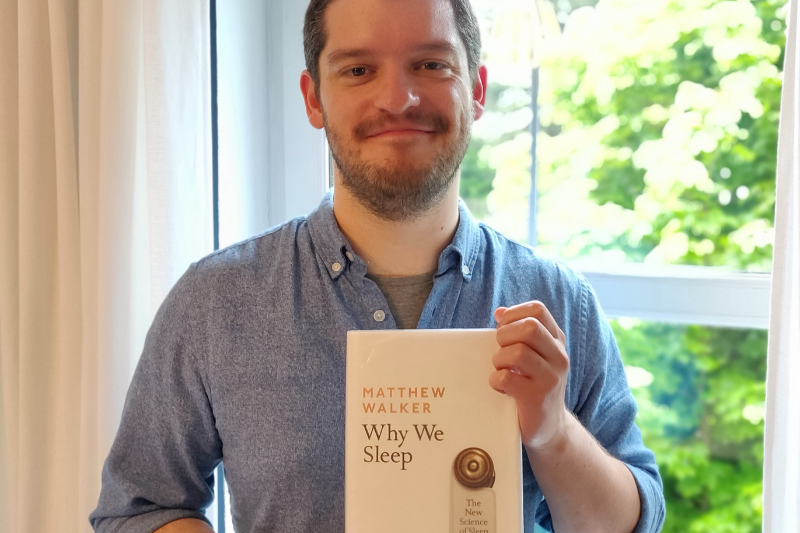Do you ever wonder how important sleep is for our mental health? Postgraduate Community Assistant, Daniel Magennis, reviews his favourite book, ‘Why We Sleep’ by Matthew Walker.
Sleep is one of the first things we sacrifice when assignments pile up or deadlines approach. Being reasonable people, however, we bargain with ourselves; once this (and that) is done, we will finally rest and catch up on missed sleep. Unfortunately, our time asleep is not a resource that can be managed in this way. As students we should be especially concerned with the damage caused by a lack of sleep. The damage is both mental and physical, short and long term.
Matthew Walker’s book Why We Sleep has changed my attitude towards sleep. Its message is simple: seven to eight hours a night is, for better or for worse, non-negotiable. Walker’s mission is to convince people that, far from being spent unproductively, the hours we spend sleeping are among the most useful of our lives. And in many ways the most eventful as well: “Sleep is not the absence of wakefulness … our nighttime sleep is an exquisitely complex, metabolically active, and deliberately ordered series of unique stages.”
I don’t want to get into the dangers of sleeping too little (they are as numerous as they are terrifying) and Walker’s book is more than just a warning. The benefits of sleep are incontrovertible and especially relevant for students. A full night’s sleep before we learn new things allows the brain to transfer memories from its limited, short-term site (the hippocampus) to more permanent locations. Sleep time brainwave activity known as “sleep spindles” that take place during NREM sleep (non-rapid eye movement; a largely dreamless phase of sleep that occurs mostly earlier in the night) ensure that the well-rested mind awakens primed to absorb new information. The same process the night after learning helps the mind to “solidify new memories.” The effect is dramatic: new information learned is recalled up to 40% more effectively after a full night’s sleep. This means that late night cramming before an exam or forcing ourselves to read just one more article is far less likely to be decisive than we think.
If sleep early in the night helps us to safely store memories and facts, sleep later in the night is no less essential. Plentiful REM sleep (which takes place mostly during the later stages of sleep and is when most of our dreaming occurs) also primes our minds for the creative challenges that face us daily. Every discipline calls for creative and lateral thinking. Dreaming allows the mind to relive memories and experiences, sometimes in strange ways, allowing the brain to make novel connections observe commonalities from our daytime existence. Language-learning benefits especially from this in-built pattern-finding, as can be seen from toddlers and young children, whose extremely REM-rich sleep lets them learn complex grammatical rules without being explicitly taught. Walker likens this nightly journey through our memory’s archives as the creation of a “Mind Wide Web” that helps us solve the problems of our time awake.
Ample REM sleep also helps to bolster our emotional resilience. Sleep is the “stoic sentinel that guards your sanity and emotional well-being” – a sort of internal overnight therapy that set us up to weather the trials of the day ahead. Experiencing again our daytime experiences removes the “painful sting” of trying and traumatic memories, allowing us to wake restored and with resolution. Many great minds throughout history were aware of sleep’s benefits. Shakespeare wasn’t wrong when he charted Macbeth’s tragic downfall accompanying a lack of sleep:
Sleep that knits up the raveled sleave of care,
The death of each day’s life, sore labor’s bath,
Balm of hurt minds, great nature’s second course,
Chief nourisher in life’s feast.
Although we are unlikely to usurp the throne of Scotland after burning the candle at both ends, trying to squeeze out a few more productive hours before the day begins may in fact be doing us more harm than good.
Why We Sleep provides a wealth of fascinating and useful facts about sleep. As Walker notes in his TED talk on this subject (“Sleep is your superpower”) sleep is “your life support system, and it is Mother Nature’s best effort yet at immortality.” Sleep helps us function in the short term, but also allows our bodies and minds to perform essential nightly maintenance that equally helps us to flourish in the long-term. For everyone – especially students – our eight hours of sleep should be a jealously guarded time. It is not a luxury and we should not feel guilty for our time asleep.
Daniel Magennis
Postgraduate Community Assistant and PhD student in French

